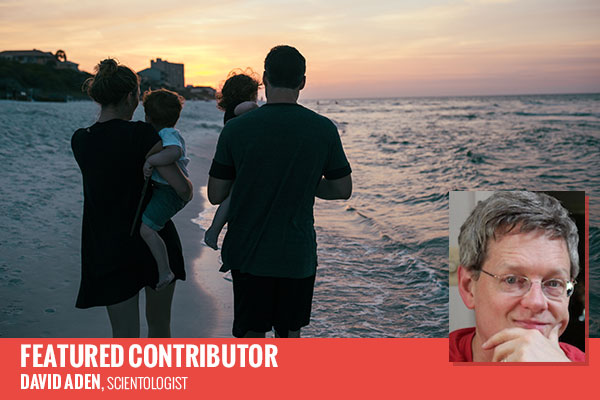
A Scientologist Weighs in on the Challenges of Being a Parent
- By David Aden --
- 05 Dec 2016 --

Do a Scientologist’s beliefs impact their views on raising children?
Anyone who has been a parent for more than five minutes knows that it is an ongoing balancing act. Am I too strict or not strict enough? Should I try to protect them from every little fall or let them learn themselves? Do I expect too little from my children or am I demanding too much?
A Scientologist Weighs in on the Challenges of Being a Parent[/tweetthis]
That kind of ambiguity is built into the job because single-minded, single-shot solutions like the very old-fashioned “a child should be seen and not heard” might work sometimes but they never work all the time. That’s probably true in any area of life— fixed, unyielding “solutions” can fool us by seeming to “work” just often enough to be seductive, only to miserably fail in the long run. That is never more true than when it comes to raising children.
As a Scientologist of more than 30 years with two boys and now six grandchildren, I’ve experienced a few ups and downs and I’ve seen a range of approaches to parenting amongst my friends— Scientologist and non-Scientologist alike.
I’ve also made more than my share of mistakes as a parent.
Given those mistakes, you can imagine my happiness when I discovered that whatever my failings were as a parent, as a grandparent I can pretty much do no wrong—no matter what my sons and daughters-in-law may think or say.
But, what of Scientologists generally? Does our faith impact our views on childrearing and, if so, how?
As always, I can’t speak for all Scientologists—we are a remarkably diverse group, culturally, educationally, artistically and politically—but I can identify at least a point of orientation that in my experience most Scientologists consider when deciding how to love and help their children.
Scientologists believe that our fundamental nature is spiritual. We have a body and a mind but we are spiritual beings.
For most Scientologists this belief lends additional emphasis to the way parents instinctively and naturally feel about their children: that they are unique, that they deserve our love and respect, that we have the happy privilege of helping them grow, learn about and understand the world in which they live and that we’d like nothing more than to help them find and fulfill their own purposes.
Learn Scientology Parenting Techniques & Tips in this free iPad & online course: https://t.co/bZrZ6dcD9c https://t.co/uA7VSmeK2P
— Scientology (@Scientology) November 2, 2016
Because of this belief I feel that parents are tasked with helping our children grow into themselves. But, we are also tasked with protecting and guiding them—children just left on their own do not suddenly or magically “ripen” into fully able and moral adults. So, as I said, there is a balancing act.
Scientologists do object when child are treated like chattel, when their ideas and wishes are habitually dismissed out of hand simply because they are children. Scientologists do protest when children are treated like chemical experiments and forced to take drugs for normal childhood behaviors like fidgeting, getting distracted, throwing tantrums or acting up. Of course, one doesn’t need to be a Scientologist to object when “authorities” push dangerous, highly addictive drugs instead of helping parents find out and address what is really bothering their children.
In the final analysis, is there a common approach Scientologist take when raising children? Probably nothing approaching a uniform method, but L. Ron Hubbard, the Founder of the Scientology religion, suggests the following in his nonreligious moral code The Way to Happiness which I’ve found helpful:
There are almost as many theories on how to raise a child or not raise him as there are parents. Yet if one does it wrong much grief can result and one may even complicate his or her own later years. Some try to raise children the way they were themselves raised, others attempt the exact opposite, many hold to an idea that children should just be let grow on their own. None of these guarantee success.
…What does have a workability is simply to try to be the child’s friend. It is certainly true that a child needs friends. Try to find out what a child’s problem really is and, without crushing their own solutions, try to help solve them. Observe them—and this applies even to babies. Listen to what children tell you about their lives. Let them help—if you don’t, they become overwhelmed with a sense of obligation which they then must repress.
…
A child factually does not do well without love. Most children have an abundance of it to return.


















